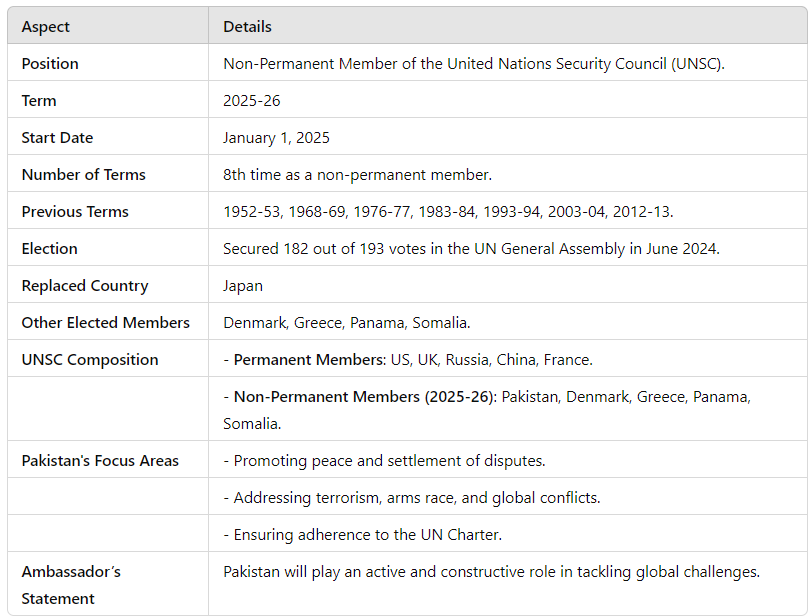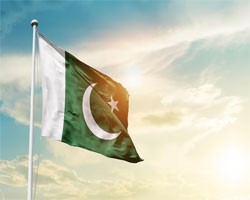Banking Current Affairs
| International Relations |
|---|
|
|
|
Key Highlights
Start of Tenure: Pakistan officially began its 2025-26 term as a non-permanent member of the United Nations Security Council (UNSC) on January 1. Eighth Term: This marks the eighth time Pakistan has held a non-permanent seat on the UNSC, previously serving in: 2012-13, 2003-04, 1993-94, 1983-84, 1976-77, 1968-69, and 1952-53. Election Details General Assembly Vote: Pakistan was elected in June 2024 with 182 votes out of 193, significantly exceeding the two-thirds majority (124 votes) required. Replacement: Pakistan replaced Japan, which held the Asian seat for the 2023-24 term. New Members: Along with Pakistan, Denmark, Greece, Panama, and Somalia were also elected as non-permanent members, replacing Japan, Ecuador, Malta, Mozambique, and Switzerland. UNSC Composition Permanent Members (P5): United States, Russia, China, United Kingdom, France (veto-wielding powers). Current Non-Permanent Members: Newly Elected (2025-26 Term): Pakistan, Denmark, Greece, Panama, Somalia. Continuing (2024-25 Term): Algeria, Guyana, South Korea, Sierra Leone, Slovenia. Significance of Pakistan’s Role Geopolitical Context: Tenure begins amidst global geopolitical turbulence, including: Wars in Europe, the Middle East, and Africa. Intensifying rivalries between major powers. A multi-dimensional arms race. Pakistan’s Goals: Halt Wars: Advocate for conflict resolution and the pacific settlement of disputes. Tackle Global Challenges: Address terrorism, arms races, and the emergence of new conflict domains. Promote Peace: Uphold the principles of the UN Charter for maintaining international peace and security. Pakistan’s Population Advantage: As the fifth-largest population, Pakistan aims to play a constructive and active role in international decision-making. Statement by Ambassador Munir Akram Representation: Pakistan’s delegation will have an active and constructive presence on the council. Commitment: Work towards reducing the negative impacts of power rivalries, arms races, and terrorism. Focus Areas: Ensure adherence to the UN Charter and work for international peace. About United Nations Security Council (UNSC) What is the UNSC? It is one of the main bodies of the United Nations (UN), responsible for maintaining international peace and security. All UN Member States must follow its decisions. Key Functions: Identifies threats to peace or acts of aggression. Encourages peaceful resolution of disputes. Can impose sanctions or authorize military action to maintain peace. Powers: Establish peacekeeping missions. Impose international sanctions. Authorize military action through resolutions. Membership: 15 Members in total: 5 Permanent Members (P5): United States, United Kingdom, Russia, China, and France, who have veto power. 10 Non-Permanent Members: Elected for 2 years by the UN General Assembly, ensuring representation from different regions: 5 from Africa/Asia, 1 from Eastern Europe, 2 from Latin America, 2 from Western Europe/Other areas. Headquarters: Located at the United Nations Headquarters in New York City. |
|
|

|
|
|
|
Frequently Asked Questions (FAQs) in Competitive Exams:
Q1. Consider the following statements regarding Pakistan's non-permanent membership in the UNSC: 1. Pakistan has been elected as a non-permanent member of the UNSC for the 8th time. 2. Pakistan replaced South Korea in the UNSC for the 2025-26 term. 3. Non-permanent members of the UNSC do not have veto power. Which of the statements given above is/are correct? (a) 1 and 3 only (b) 2 and 3 only (c) 1 and 2 only (d) 1, 2, and 3 Answer: (a) 1 and 3 only Q2. India’s non-permanent membership in the UNSC for 2021-22 focused on which of the following key areas? (a) Counterterrorism and maritime security (b) Global vaccine equity and climate change (c) Both (a) and (b) (d) Reforming the UN Charter Answer: (c) Both (a) and (b) Q3. Which of the following countries were elected alongside Pakistan for non-permanent UNSC membership for the 2025-26 term? (a) Denmark, Greece, Panama, Somalia (b) Algeria, Guyana, South Korea, Sierra Leone (c) Japan, Ecuador, Malta, Mozambique (d) Switzerland, France, China, India Answer: (a) Denmark, Greece, Panama, Somalia Q4. Consider the following statements about the UNSC: 1. The UNSC has 15 members, including 10 non-permanent members and 5 permanent members. 2. India has served as a non-permanent member of the UNSC eight times. 3. Non-permanent members are elected by the UN General Assembly for a two-year term. Which of the statements given above is/are correct? (a) 1 only (b) 1 and 3 only (c) 2 and 3 only (d) 1, 2, and 3 Answer: (b) 1, 2 and 3 |
| >> More Banking Current Affairs |
